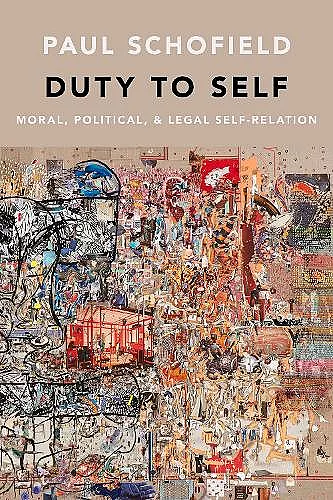Duty to Self
Moral, Political, and Legal Self-Relation
Format:Hardback
Publisher:Oxford University Press Inc
Published:26th Aug '21
Should be back in stock very soon

That we owe duties to others is a commonplace, the subject of countless philosophical treatises and monographs. Morality is interpersonal and other-directed, many claim. But what of what we owe ourselves? In Duty to Self, Paul Schofield flips the paradigm of interpersonal morality by arguing that there are moral duties we owe ourselves, and that in light of this, philosophers need to significantly rethink many of their views about practical reason, moral psychology, politics, and moral emotions. Among these views is the idea that divisions within a person's life enable her to relate to herself second-personally--that is, as though she were relating to a distinct other person--in the way required by morality. Further, there exist political duties owed to the self, which the state may coerce persons to perform. This amounts to a novel argument for paternalistic law, which appeals to considerations of right, justice, and freedom in order to justify coercing a person for their own sake--a liberal justification for an idea typically thought to be deeply at odds with liberalism. Schofield untangles how this view would impact various issues in applied ethics and political philosophy, for example, financial prudence and risk, the pursuit of the good life, and medical ethics. Duty to Self is essential for anyone working in moral and political philosophy or political theory.
Schofield's framework is inventive and fruitful. * Daniel Muñoz, University of North Carolina at Chapel Hill, Ethics *
In this well-written, historically informed, and thought-provoking book, Paul Schofield argues that the answer may well be "yes." If you begin this book thinking that the very idea of an intrapersonal moral duty just doesn't make sense, you should finish it thinking you were wrong...Schofield has given us a rich account of how we can have duties to ourselves. If you're at all interested in that topic and, more broadly, the nature of the moral domain, you should read this book. * Daniel Groll, Criminal Law and Philosophy *
In Duty to Self: Moral, Political, and Legal Self-Relation, Paul Schofield has written a deep, erudite, and comprehensive defense of the view that we do owe duties to ourselves. Schofield presents a range of arguments for this claim, one which many contemporary ethicists have found counter-intuitive, as self-regard has often been viewed as a matter of prudence rather than morality. I learned an enormous amount from reading this book, and I highly recommend it. * Julia Driver, Professor of Philosophy, The University of Texas at Austin *
The idea of duties to oneself occupies a peculiar place in philosophy and in everyday thinking. We say things like 'You owe it to yourself,' and indeed it might seem that if there are duties and obligations at all then they apply to all the people in question, including oneself. And yet other familiar relations of authority require a separation between the power to impose an obligation and the subjection to that obligation, if there is to be any binding at all. Thus, some moral and political philosophers have found the very notion of duties to oneself to be incoherent, while others have argued that duties to oneself are fundamental to the idea of duties of any kind. Paul Schofield's exciting and ground-breaking book not only presents a sustained case for the coherence of the idea of duties to oneself but shows how revisionary taking this idea seriously can turn out to be. * Richard Moran, Brian D. Young Professor of Philosophy, Harvard University *
Modern moral philosophy's preoccupation with interpersonal duties has led to a neglect of, and scepticism concerning, duties to ourselves. In Duty to Self, Paul Schofield not only rebuts the sources of such scepticism, he convincingly illustrates how we can occupy a second-personal moral standpoint on our choices and our lives. Schofield's conclusions have fascinating and wide-ranging implications in the practical, political, and legal realms. * Michael Cholbi, Professor of Philosophy, University of Edinburgh *
ISBN: 9780190941758
Dimensions: 213mm x 150mm x 23mm
Weight: 408g
236 pages